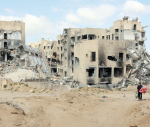You are here
More burden than Jordan can carry
Mar 15,2016 - Last updated at Mar 15,2016
Deputy Prime Minister and Minister of Education Mohammad Thneibat allowed a glimpse into the size of the burden Jordan carries in the process of educating Syrian children whose families took refuge in the Kingdom, which stands at JD250 million annually.
Speaking in Dubai at the 4th Global Education and Skills Forum, the minister said that over 200,000 students of 85 nationalities are enrolled in Jordan’s public schools, of which more than 145,000 are Syrian.
To be able to accommodate this huge number, Jordan built 5,000 additional classrooms at the price of over $600 million, a costly endeavour considering that only 38 per cent of this figure and a measly 25 per cent of the total cost of educating children of Syrian refugees is supported by donors and international organisations.
Besides the burden on the economy, accommodating these children in schools — an important initiative if one wishes to avoid the negative consequences of leaving them out — there is the discomfort of having to resort to the double-shift system, inevitable in view of the shortage of classrooms.
Jordan has not only honoured its responsibility to offer primary and basic education to children living in Jordan, irrespective of their nationality and status; it has gone beyond it.
Article 13.2 of the International Covenant on Economic, Social and Cultural Rights, to which Jordan is a state party, stipulates that “primary education shall be compulsory and available to all”, but it poses no obligation on a country to offer free education to students beyond the primary level.
Yet Jordan is doing that by keeping its public school system open to children of all nationalities beyond the primary level of education.
To be able to keep playing this generous role, the Kingdom needs more support from the international community.
It alone cannot continue supporting refugees and their children beyond its means.
It is a huge challenge that Jordan bears on behalf of major donor nations, and they should all realise it and act accordingly.















